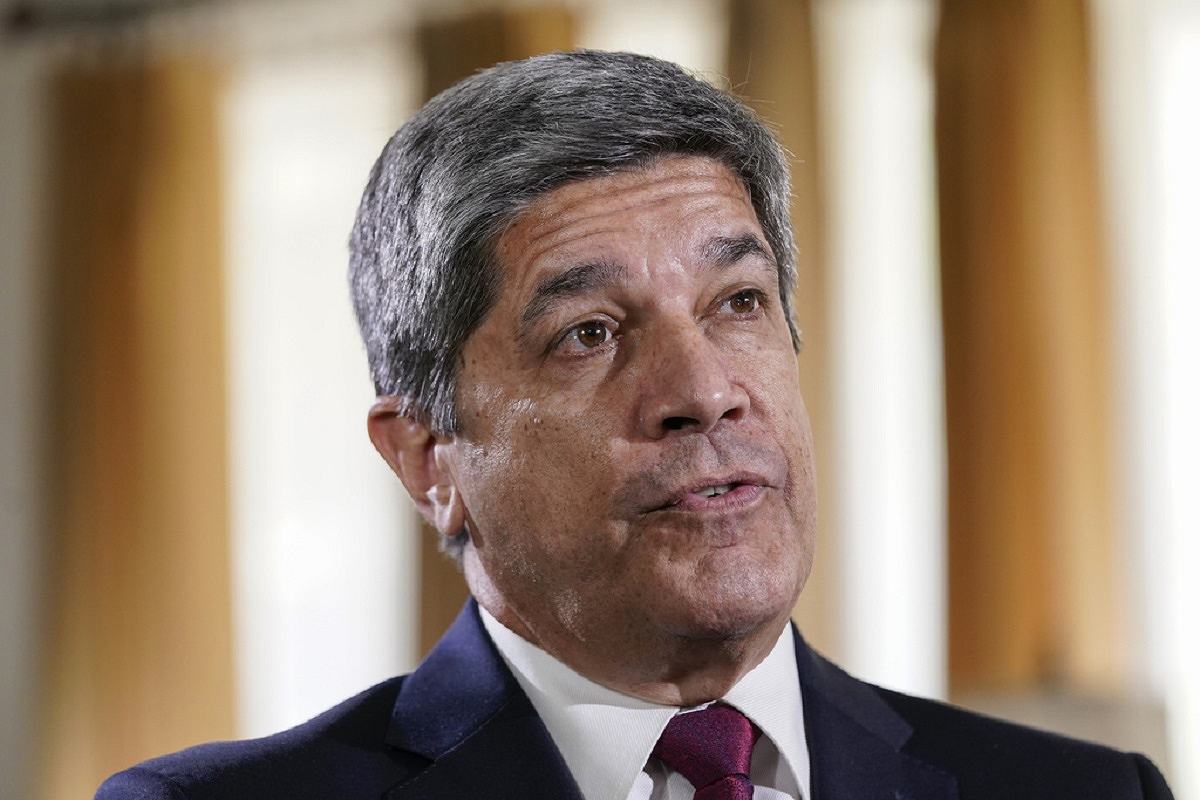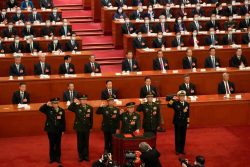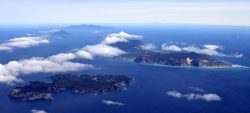
Cuban Deputy Foreign Minister Carlos Fernandez de Cossio is interviewed by The Associated Press on Friday, April 22, 2022, in Washington.
11:46 JST, April 15, 2023
BETHESDA, Md. (AP) — Cuba plans to resume accepting deportation flights from the United States this month, a Cuban official said, echoing U.S. concerns about the highest levels of Cuban migration in six decades.
Carlos Fernandez de Cossio, Cuba’s deputy foreign minister, said flights are expected before the U.S. ends coronavirus pandemic-related restrictions on asylum on May 11, which is widely projected to increase the number of people seeking entry to the U.S. at the U.S.-Mexico border.
The diplomat spoke in an interview with The Associated Press at the Cuban ambassador’s residence outside Washington after what he called “a productive meeting” with U.S. Department of Homeland Security officials to discuss migration.
“We have a lot of common understanding, both parties, the United States and Cuba, about the nature of the problem,” he said.
Fernandez de Cossio said there was no agreement on the frequency of flights, which will depend on U.S. and Cuban capacity. But he said there was no reason they can’t return to pre-pandemic levels of about twice a month. The last flight was in December 2020.
The Department of Homeland Security did not immediately respond to a request for comment Friday.
Cubans were stopped nearly 43,000 times at the U.S. border with Mexico in December, becoming one of the largest nationalities entering the United States. Numbers plummeted in January after President Joe Biden’s administration announced that Cubans could fly to the U.S. if they applied online and had a financial sponsor and that they would be expelled back to Mexico if they crossed the border illegally.
“We’re going to see if we can get one in the coming weeks and then to make that regular so that people can be easily removed, not to Mexico but directly to Cuba,” Fernandez de Cossio said late Thursday.
He said that numbers of Cubans fleeing on boats, particularly high-powered vessels associated with smugglers, have been rising after a fall earlier this year and that more Cubans were leaving the country to fly to Nicaragua as tourists, typically the first step for Cubans to travel by land to the U.S.-Mexico border.
Fernandez de Cassio said the changes announced in January under which people from Cuba, Haiti, Nicaragua and Venezuela can apply for humanitarian parole to come to the U.S. have been successful in reducing the numbers of Cubans trying to cross the U.S.-Mexico border. But he cautioned that it wasn’t a long-term fix.
“It would be irresponsible for us or naive to think that this will be sustainable in the long term because there will always be a limit on the amount of visas,” he said.
It is unclear how many flights the U.S. will need to mount a serious deterrent to Cuban migration.
The two countries have planned five removal flights since November, but each was called off for various operational issues, said Fernandez de Cossio, emphasizing that Cuba has supported the flights in theory.
U.S. Border Patrol agents stopped more migrants last year than at any other time on record, largely driven by arrivals of people from Cuba, Venezuela and Nicaragua, countries with strained diplomatic relations. It has been extremely difficult for the U.S. to sponsor deportation flights to those countries, forcing the Biden administration to turn to Mexico for help hosting the migrants.
The Biden administration has gone into overdrive preparing for the end of Title 42, the public health authority under which migrants have been expelled from the U.S. more than 2.7 million times without an opportunity to seek asylum on the grounds of preventing the spread of COVID-19.
This week, the U.S., Panama and Colombia announced a plan to stop migration through the notorious Darien Gap in Panama, where people are often killed. It also began testing expedited initial screening for asylum at an undisclosed border crossing, hoping to quickly return those who don’t pass.
Fernandez de Cossio said he pressed during talks in Washington to alleviate economic sanctions against Cuba and changes to the Cuban Adjustment Act, which makes Cubans eligible for legal residency after one year in the United States.
Top Articles in News Services
-

Survey Shows False Election Info Perceived as True
-

Hong Kong Ex-Publisher Jimmy Lai’s Sentence Raises International Outcry as China Defends It
-

Japan’s Nikkei Stock Average Touches 58,000 as Yen, Jgbs Rally on Election Fallout (UPDATE 1)
-

Japan’s Nikkei Stock Average Falls as US-Iran Tensions Unsettle Investors (UPDATE 1)
-

Japan’s Nikkei Stock Average Rises on Tech Rally and Takaichi’s Spending Hopes (UPDATE 1)
JN ACCESS RANKING
-

Producer Behind Pop Group XG Arrested for Cocaine Possession
-

Japan PM Takaichi’s Cabinet Resigns en Masse
-

Man Infected with Measles Reportedly Dined at Restaurant in Tokyo Station
-

Israeli Ambassador to Japan Speaks about Japan’s Role in the Reconstruction of Gaza
-

Videos Plagiarized, Reposted with False Subtitles Claiming ‘Ryukyu Belongs to China’; Anti-China False Information Also Posted in Japan
























